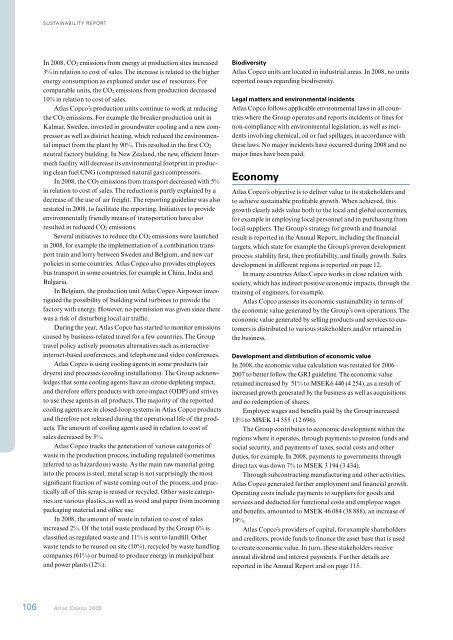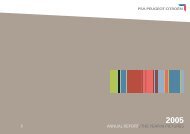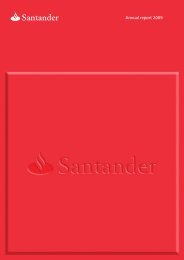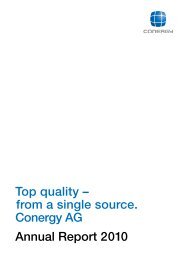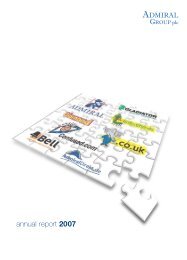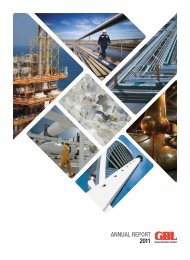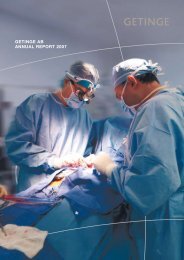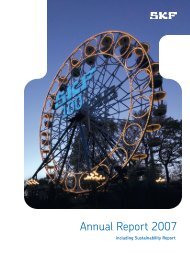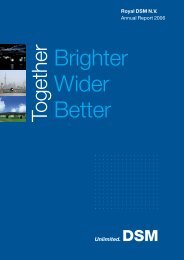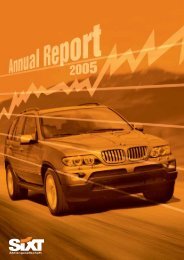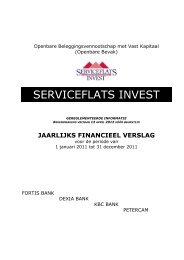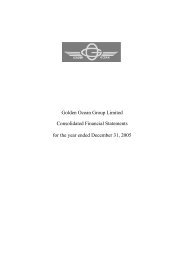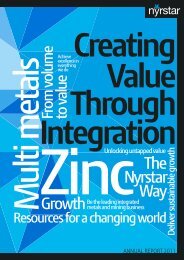SUSTAINABILITY REPORTIn <strong>2008</strong>, CO 2 emissions from energy at production sites increased3% in relation <strong>to</strong> cost of sales. The increase is related <strong>to</strong> the higherenergy consumption as explained under use of resources. Forcomparable units, the CO 2 emissions from production decreased10% in relation <strong>to</strong> cost of sales.<strong>Atlas</strong> <strong>Copco</strong>’s production units continue <strong>to</strong> work at reducingthe CO 2 emissions. For example the breaker production unit inKalmar, Sweden, invested in groundwater cooling and a new compressoras well as district heating, which reduced the environmentalimpact from the plant by 90%. This resulted in the first CO 2neutral fac<strong>to</strong>ry building. In New Zealand, the new, efficient Intermechfacility will decrease its environmental footprint in producingclean fuel CNG (compressed natural gas) compressors.In <strong>2008</strong>, the CO 2 emissions from transport decreased with 5%in relation <strong>to</strong> cost of sales. The reduction is partly explained by adecrease of the use of air freight. The reporting guideline was alsorestated in <strong>2008</strong>, <strong>to</strong> facilitate the reporting. Initiatives <strong>to</strong> provideenvironmentally friendly means of transportation have alsoresulted in reduced CO 2 emissions.Several initiatives <strong>to</strong> reduce the CO 2 emissions were launchedin <strong>2008</strong>, for example the implementation of a combination transporttrain and lorry between Sweden and Belgium, and new carpolicies in some countries. <strong>Atlas</strong> <strong>Copco</strong> also provides employeesbus transport in some countries, for example in China, India andBulgaria.In Belgium, the production unit <strong>Atlas</strong> <strong>Copco</strong> Airpower investigatedthe possibility of building wind turbines <strong>to</strong> provide thefac<strong>to</strong>ry with energy. However, no permission was given since therewas a risk of disturbing local air traffic.During the <strong>year</strong>, <strong>Atlas</strong> <strong>Copco</strong> has started <strong>to</strong> moni<strong>to</strong>r emissionscaused by business-related travel for a few countries. The Grouptravel policy actively promotes alternatives such as interactiveinternet-based conferences, and telephone and video conferences.<strong>Atlas</strong> <strong>Copco</strong> is using cooling agents in some products (airdryers) and processes (cooling installations). The Group acknowledgesthat some cooling agents have an ozone depleting impact,and therefore offers products with zero impact (ODP) and strives<strong>to</strong> use these agents in all products. The majority of the reportedcooling agents are in closed-loop systems in <strong>Atlas</strong> <strong>Copco</strong> productsand therefore not released during the operational life of the products.The amount of cooling agents used in relation <strong>to</strong> cost ofsales decreased by 5%.<strong>Atlas</strong> <strong>Copco</strong> tracks the generation of various categories ofwaste in the production process, including regulated (sometimesreferred <strong>to</strong> as hazardous) waste. As the main raw material goingin<strong>to</strong> the process is steel, metal scrap is not surprisingly the mostsignificant fraction of waste coming out of the process, and practicallyall of this scrap is reused or recycled. Other waste categoriesare various plastics, as well as wood and paper from incomingpackaging material and office use.In <strong>2008</strong>, the amount of waste in relation <strong>to</strong> cost of salesincreased 2%. Of the <strong>to</strong>tal waste produced by the Group 6% isclassified as regulated waste and 11% is sent <strong>to</strong> landfill. Otherwaste tends <strong>to</strong> be reused on site (10%), recycled by waste handlingcompanies (61%) or burned <strong>to</strong> produce energy in municipal heatand power plants (12%).Biodiversity<strong>Atlas</strong> <strong>Copco</strong> units are located in industrial areas. In <strong>2008</strong>, no unitsreported issues regarding biodiversity.Legal matters and environmental incidents<strong>Atlas</strong> <strong>Copco</strong> follows applicable environmental laws in all countrieswhere the Group operates and reports incidents or fines fornon-compliance with environmental legislation, as well as incidentsinvolving chemical, oil or fuel spillages, in accordance withthese laws. No major incidents have occurred during <strong>2008</strong> and nomajor fines have been paid.Economy<strong>Atlas</strong> <strong>Copco</strong>’s objective is <strong>to</strong> deliver value <strong>to</strong> its stakeholders and<strong>to</strong> achieve sustainable profitable growth. When achieved, thisgrowth clearly adds value both <strong>to</strong> the local and global economies,for example in employing local personnel and in purchasing fromlocal suppliers. The Group’s strategy for growth and financialresult is reported in the <strong>Annual</strong> <strong>Report</strong>, including the financialtargets, which state for example the Group’s proven developmentprocess: stability first, then profitability, and finally growth. Salesdevelopment in different regions is reported on page 12.In many countries <strong>Atlas</strong> <strong>Copco</strong> works in close relation withsociety, which has indirect positive economic impacts, through thetraining of engineers, for example.<strong>Atlas</strong> <strong>Copco</strong> assesses its economic sustainability in terms ofthe economic value generated by the Group’s own operations. Theeconomic value generated by selling products and services <strong>to</strong> cus<strong>to</strong>mersis distributed <strong>to</strong> various stakeholders and/or retained inthe business.Development and distribution of economic valueIn <strong>2008</strong>, the economic value calculation was restated for 2006–2007 <strong>to</strong> better follow the GRI guideline. The economic valueretained increased by 51% <strong>to</strong> MSEK6 440 (4 254), as a result ofincreased growth generated by the business as well as acquisitionsand no redemption of shares.Employee wages and benefits paid by the Group increased15% <strong>to</strong> MSEK 14 555 (12 696).The Group contributes <strong>to</strong> economic development within theregions where it operates, through payments <strong>to</strong> pension funds andsocial security, and payments of taxes, social costs and otherduties, for example. In <strong>2008</strong>, payments <strong>to</strong> governments throughdirect tax was down 7% <strong>to</strong> MSEK 3 194 (3 434).Through subcontracting manufacturing and other activities,<strong>Atlas</strong> <strong>Copco</strong> generated further employment and financial growth.Operating costs include payments <strong>to</strong> suppliers for goods andservices and deducted for functional costs and employee wagesand benefits, amounted <strong>to</strong> MSEK 46 084 (38 888), an increase of19%.<strong>Atlas</strong> <strong>Copco</strong>’s providers of capital, for example shareholdersand credi<strong>to</strong>rs, provide funds <strong>to</strong> finance the asset base that is used<strong>to</strong> create economic value. In turn, these stakeholders receiveannual dividend and interest payments. Further details arereported in the <strong>Annual</strong> <strong>Report</strong> and on page 115.106 <strong>Atlas</strong> <strong>Copco</strong> <strong>2008</strong>
Cus<strong>to</strong>mers<strong>Atlas</strong> <strong>Copco</strong> strives <strong>to</strong> be the preferred supplier <strong>to</strong> current andpotential cus<strong>to</strong>mers, by developing, manufacturing, and deliveringquality products and solutions that provide superior productivity.The Group’s success depends on the interactionwith cus<strong>to</strong>mers.By providing high quality products and services which meet orexceed cus<strong>to</strong>mer requirements, the Group adds value <strong>to</strong> its cus<strong>to</strong>mers’own operations and business objectives.<strong>Atlas</strong> <strong>Copco</strong> cus<strong>to</strong>mer centers track their performance interms of cus<strong>to</strong>mer share, as a measurement of how cus<strong>to</strong>mersvalue the products and services offered by the Group. Furthermore,in accordance with the Group’s quality policy, all units conductcus<strong>to</strong>mer surveys <strong>to</strong> measure how satisfied cus<strong>to</strong>mers arewith <strong>Atlas</strong> <strong>Copco</strong>. They are implementing the Net PromoterScore (NPS) concept <strong>to</strong> measure cus<strong>to</strong>mer loyalty and <strong>to</strong> continuouslyimprove performance. The overall objective is <strong>to</strong> achievelong-term profitable growth.The Group recognizes it has reputation risks related <strong>to</strong> theassociation with certain cus<strong>to</strong>mers. In countries defined <strong>to</strong> be highrisk areas or at risk, <strong>Atlas</strong> <strong>Copco</strong> seeks <strong>to</strong> minimize these risks bysafeguarding that its own commitments are met regarding its businesspractices and the safety and technological leadership of itsproducts and services. In addition <strong>to</strong> this, <strong>Atlas</strong> <strong>Copco</strong> strives <strong>to</strong>build awareness for the ethical guidelines supported by the Group.The Group has launched a cus<strong>to</strong>mer risk assessment guideline, <strong>to</strong>assist <strong>Atlas</strong> <strong>Copco</strong> companies in the process. This guideline will inparticular be used in cases of financing by credit export agencies.<strong>Atlas</strong> <strong>Copco</strong> follows both local and international rules (USOFAC, UN and EU) and regulations regarding trading in highrisk countries. In all of its operations <strong>Atlas</strong> <strong>Copco</strong> follows its ownBusiness Code of Practice.Products and Solutions<strong>Atlas</strong> <strong>Copco</strong>’s products and solutions are continuously improvedin regards <strong>to</strong> cus<strong>to</strong>mers’ demands of quality, costs and efficiencyas well as in regards <strong>to</strong> ergonomic, environmental and health andsafety aspects.Seen over the entire product life cycle, the largest environmentalimpact takes place during the use of <strong>Atlas</strong> <strong>Copco</strong> products. Indesigning its products <strong>Atlas</strong> <strong>Copco</strong> aims <strong>to</strong> reduce environmentalimpact and improve the performance of every product. Life cycleassessments show energy consumption has the most significantenvironmental impact. All new products are also assessed from ahealth and safety perspective. <strong>Atlas</strong> <strong>Copco</strong> assesses relevantaspects of ergonomics, safety and health not only in its productdevelopment process but in all life-cycle stages of the product.<strong>Atlas</strong> <strong>Copco</strong> is organized in three separate, but still integrated,business areas. Each business area operates globally. Dep<strong>ending</strong>on the nature of the products and solutions offered, the focus andpriorities vary. It is difficult <strong>to</strong> report a consolidated figure fortheir environmental impact, since each business area manufacturesa wide variety of products and solutions. Some examples ineach business area are given below.Compressor Technique business areaIn <strong>2008</strong>, the Compressor Technique business area escalated thefocus <strong>to</strong> continuously improve both products and services,designed <strong>to</strong> reduce cus<strong>to</strong>mers’ energy consumption and increasetheir capacity.A <strong>record</strong> number of AirScan audits were performed, resultingin recommendations for how cus<strong>to</strong>mers could reduce theirenergy costs and carbon footprints. These audits went beyond theinstalled <strong>Atlas</strong> <strong>Copco</strong> equipment by looking at other practicalaspects of the system configuration, such as the management ofair leaks in the hose/pipe connections <strong>to</strong> the compressors.The expansion of the portfolio of equipment upgrade kits,allowing cus<strong>to</strong>mers <strong>to</strong> benefit from service products such asAirOptimizer, provides comprehensive control for the entiresystem installations or configurations for cus<strong>to</strong>mers. This type ofintelligent control system has been shown <strong>to</strong> produce energysavings of 25%.Product improvements were realized for compressors of allbrands owned by <strong>Atlas</strong> <strong>Copco</strong>. Examples include new refrigerantdryers that were introduced, providing an average reduction inenergy consumption of 40%. The most energy-efficient oilinjectedcompressors ever produced, using an average of 13% lesselectricity and reducing energy requirements by 5–6% compared<strong>to</strong> previous models, were also launched.The introduction of near net-shaped ro<strong>to</strong>rs in cast iron,instead of starting with a steel bar and mill the shape of thero<strong>to</strong>rs, resulted in financial savings, capacity increases and in asaving in the use of raw materials and energy.In <strong>2008</strong>, more variable speed drive compressors were soldthan ever before, bringing energy consumption reductions andreduced carbon footprints <strong>to</strong> more cus<strong>to</strong>mers around the globe.Construction and Mining Technique business areaPart of the Construction and Mining Technique business area’sstrategy is <strong>to</strong> develop new products and offer services <strong>to</strong> improvecus<strong>to</strong>mers’ productivity and <strong>to</strong> ensure a safe working environmentas well as reducing the impact on the environment.Ground source heating utilizes recyclable energy s<strong>to</strong>red in theconstant temperature layer of the ground <strong>to</strong> realize heating in<strong>Atlas</strong> <strong>Copco</strong> <strong>2008</strong> 107
- Page 1 and 2:
Atlas Copco2008 - tough ending to a
- Page 3 and 4:
• Strong order growth in most are
- Page 5 and 6:
Revenues by business areaRevenues b
- Page 7 and 8:
educing Atlas Copco’s main enviro
- Page 9 and 10:
Many new products were introduced d
- Page 11 and 12:
TargetsFinancial targetsAtlas Copco
- Page 13 and 14:
StructureThe Group is organized in
- Page 15 and 16:
New divisionEffective January 1, 20
- Page 17:
80 000Revenues and marginsMSEK %286
- Page 22 and 23:
administration reportconcentrated t
- Page 24 and 25:
administration reportEnvironmental
- Page 26 and 27:
ADMINISTRATION REPORTCompressor Tec
- Page 28 and 29:
administration reportThe Compressor
- Page 30 and 31:
administration reportConstruction a
- Page 32 and 33:
administration reportThe Constructi
- Page 34 and 35:
administration reportIndustrial Tec
- Page 36 and 37:
administration reportThe Industrial
- Page 38 and 39:
Financial statements, atlas copco g
- Page 40 and 41:
Financial statements, atlas copco g
- Page 42 and 43:
Financial statements, atlas copco g
- Page 44 and 45:
Financial statements, atlas copco g
- Page 46 and 47:
Financial statements, atlas copco g
- Page 48 and 49:
Financial statements, atlas copco g
- Page 50 and 51:
Financial statements, atlas copco g
- Page 52 and 53:
Financial statements, atlas copco g
- Page 54 and 55:
Financial statements, atlas copco g
- Page 56 and 57:
Financial statements, atlas copco g
- Page 58 and 59: Financial statements, atlas copco g
- Page 60 and 61: Financial statements, atlas copco g
- Page 62 and 63: Financial statements, atlas copco g
- Page 64 and 65: Financial statements, atlas copco g
- Page 66 and 67: Financial statements, atlas copco g
- Page 68 and 69: Financial statements, atlas copco g
- Page 70 and 71: Financial statements, atlas copco g
- Page 72 and 73: Financial statements, atlas copco g
- Page 74 and 75: Financial statements, atlas copco g
- Page 76 and 77: Financial statements, atlas copco g
- Page 78 and 79: Financial statements, atlas copco g
- Page 80 and 81: Financial statements, atlas copco g
- Page 82 and 83: Financial statements, parent compan
- Page 84 and 85: Financial statements, parent compan
- Page 86 and 87: Financial statements, parent compan
- Page 88 and 89: Financial statements, parent compan
- Page 90 and 91: Financial statements, parent compan
- Page 92 and 93: Financial statements, parent compan
- Page 94 and 95: Financial statements, parent compan
- Page 96 and 97: Financial statements, parent compan
- Page 98 and 99: Audit ReportTo the Annual Meeting o
- Page 100 and 101: Sustainability ReportAtlas Copco’
- Page 102 and 103: SUSTAINABILITY REPORTRoles and resp
- Page 104 and 105: SUSTAINABILITY REPORTSociety and th
- Page 106 and 107: SUSTAINABILITY REPORT10080604020050
- Page 110 and 111: SUSTAINABILITY REPORTwinter and coo
- Page 112 and 113: SUSTAINABILITY REPORTNo. of acciden
- Page 114 and 115: SUSTAINABILITY REPORTBusiness Partn
- Page 116 and 117: SUSTAINABILITY REPORTShareholdersTh
- Page 118 and 119: SUSTAINABILITY REPORTSustainability
- Page 120 and 121: Corporate Governance ReportThe Boar
- Page 122 and 123: Corporate Governance ReportBoard of
- Page 124 and 125: Corporate Governance ReportGroup St
- Page 126 and 127: Corporate Governance ReportGroup Ma
- Page 128 and 129: Corporate Governance ReportRemunera
- Page 130 and 131: Corporate Governance ReportBusiness
- Page 132 and 133: The Atlas Copco ShareAt December 31
- Page 134 and 135: the atlas copco shareOwnership stru
- Page 136 and 137: Five Years in SummaryMSEK 2004 1) 2
- Page 138 and 139: Financial InformationWelcome to the
- Page 140: We are committed to yoursuperior pr


